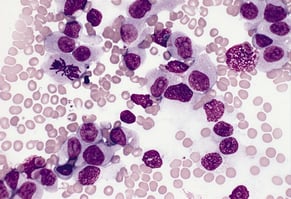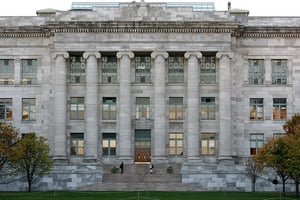Longwood Medical Area in Boston is one of the densest medical communities in the country. The 213-acre neighborhood houses four teaching hospitals, a medical school, and a diabetes research center and clinic. Five of those institutions — Boston Children’s Hospital, Brigham and Women’s Hospital, Beth Israel Deaconess Medical Center, Dana-Farber Cancer Institute, and Joslin Diabetes Center are affiliated with Harvard Medical School, which relies on them to train its students. In September 2017, Boston Children’s Hospital began construction of a $1 billion state-of-the-art clinical building.
Read MoreTags: Longwood Medical, Harvard University, cancer research, Massachusetts, Longwood Medical Center, Boston, MA, new medical buildings, laboratory suppliers, BioResearch Product Faire, laboratory products
Dr. Madelaine Bartlett, a biologist at the University of Massachusetts in Amherst, recently received a four-year $4 million grant from the National Science Foundation. The new research funding will allow Barlett and colleagues from UMass and other institutions to study the genes that regulate plant stem cell biology and their effect on fruit size and yield.
Read MoreTags: Stem cell research, University of Massachusetts Amherst, University of Massachusetts, agriculture, new research funding, Massachusetts, agricultural, MA, Northeast Region, UMASS, new research grant, NSF funding, NSF grant, NSF award, Plant Biology, agricultural business, agribusiness
Bacteria research has become an increasingly important focus for researchers in the biomedical community as of late. From studying antibiotic resistant superbugs at UCSD to investigating bacterial diversity at Rutgers University, researchers are using these microscopic organisms to provide insight into diseases that plague our society.
Read MoreTags: University of Massachusetts Amherst, Massachusetts, MA, UMASS, Bacteria, Bacterial Cell Research
Cancer Research UK released a staggering statistic in 2014: 46% of people who have cancer are diagnosed during stages 3 or 4; these late stage diagnoses greatly reduce the chances of survival, as treatment success drops once cancer has progressed to such an advanced stage.
Read MoreTags: Harvard University, cancer research, Massachusetts, Boston, MA, Zebrafish
 Acute myeloid leukemia (AML) is the most common form of leukemia affecting the blood and bone marrow, and has been responsible for 1.8% of cancer deaths in 2016. Because it is so prevalent, many research teams around the world study this disease in search of new treatment methods. One of these research teams, from Harvard University, has joined up with the pharmaceutical company Merck in a $20 million collaboration to develop new therapeutics for leukemia.
Acute myeloid leukemia (AML) is the most common form of leukemia affecting the blood and bone marrow, and has been responsible for 1.8% of cancer deaths in 2016. Because it is so prevalent, many research teams around the world study this disease in search of new treatment methods. One of these research teams, from Harvard University, has joined up with the pharmaceutical company Merck in a $20 million collaboration to develop new therapeutics for leukemia.
Tags: Harvard University, Northeast, Leukemia, cancer research, Massachusetts, Boston, BioResearch Product Faire Event, MA, Harvard, longwood, 2016, cancer therapy, Merck
A multi-institute research team, including scientists from MassBiologics at the University of Massachusetts, may have found the key to successfully treating and vaccinating against one of this decade's most famously lethal diseases: Ebola.
Read MoreTags: University of Massachusetts Amherst, University of Massachusetts, Massachusetts, MA, UMASS, virus, 2016, ebola
 Researchers at University of Massachusetts, Amherst are reaping the rewards of breakthrough food science research, in the form of USDA grants totaling over $1.5 million.
Researchers at University of Massachusetts, Amherst are reaping the rewards of breakthrough food science research, in the form of USDA grants totaling over $1.5 million.
Tags: University of Massachusetts Amherst, Massachusetts, USDA, 2015, BioResearch Product Faire Event, Research Funding, MA, research grants, Amherst, UMASS
 Scientists at Harvard Medical have made a recent breakthrough in cancer therapy research with the help of three separate grants from the National Institutes of Health, totaling over $1,153,000.
Scientists at Harvard Medical have made a recent breakthrough in cancer therapy research with the help of three separate grants from the National Institutes of Health, totaling over $1,153,000.
Tags: Harvard University, breast cancer research, cancer research, Massachusetts, Longwood Medical Center, 2015, Boston, BioResearch Product Faire Event, Harvard Medical, MA, Harvard, NIH funding, research grants, breast cancer funding, NIH grants, cancer research funding, best lab supply tradeshows, best science tradeshows
People with progressive blindness conditions, such as retinitis pigmentosa, may see renewed hope for keeping their vision longer thanks to scientists at Harvard Medical School.
Read MoreTags: Longwood Medical Campus, Massachusetts, 2015, Boston, BioResearch Product Faire Event, MA, Harvard, Harvard Medical School
Hypothalamic neurons orchestrate many essential physiological and behavioral processes via secreted neuropeptides, and are relevant to human diseases such as obesity, narcolepsy and infertility. A recent collaboration of scientists from New York, Toronto, and Tokyo, and Harvard Stem Cell Institute (HSCI) researchers have devised two methods for using stem cells to generate the type of neurons that help regulate behavioral and basic physiological functions in the human body, such as obesity and hypertension, as well as sleep, mood, and some social disorders.
Read MoreTags: Longwood Medical, Stem cell research, Massachusetts, 2015, Boston, BioResearch Product Faire Event, MA, Harvard, Harvard Medical School

